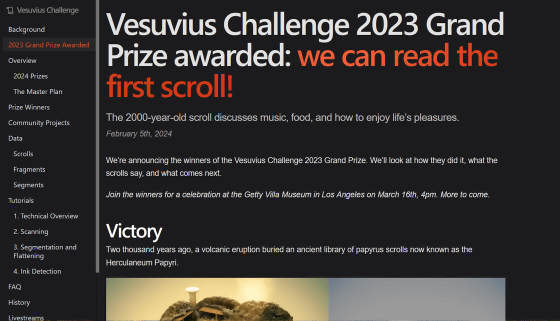The winning team of the ``Vesuvius Challenge,'' a contest to use AI to decipher ancient Roman scrolls charred by a volcanic eruption, will be announced.

Vesuvius Challenge 2023 Grand Prize awarded: we can read the scrolls! | Vesuvius Challenge
https://scrollprize.org/grandprize

First passages of rolled-up Herculaneum scroll revealed
https://www.nature.com/articles/d41586-024-00346-8
Nat Friedman Embraces AI to Translate the Herculaneum Papyri
https://www.bloomberg.com/features/2024-ai-unlock-ancient-world-secrets/
AI helps scholars read scroll buried when Vesuvius erupted in AD79 | Science | The Guardian
https://www.theguardian.com/science/2024/feb/05/ai-helps-scholars-read-scroll-buried-when-vesuvius-erupted-in-ad79
Many valuable artifacts that tell us about the life and culture of the time have been unearthed from the ruins of cities such as Pompeii and Herculaneum, which were buried by the eruption of Mount Vesuvius. Many valuable papyri called the ``Herculaneum Papyrus'' were discovered in a villa called `` Papyrus House '' in the ruins of the city of Herculaneum, but some of the papyri had become carbonized and brittle, making it impossible to open and read them. Possible scrolls were also included.
This is one of the scrolls actually excavated from the Herculaneum Papyrus. It is completely carbonized and you are hesitant to even touch it.

Nat Friedman , a former GitHub CEO and investor with an interest in ancient Roman culture, learned of the existence of the Herculaneum Papyrus, and that AI might be able to decipher the charred scrolls, which humans cannot read. I thought. Therefore, Mr. Friedman collaborated with Dr. Brent Shields of the University of Kentucky and others to hold the ``Vesuvius Challenge,'' which would offer a prize to anyone who could decipher the Herculaneum Papyrus. Details of the challenge are summarized in the article below.
``Vesuvius Challenge'' where you can get 30 million yen if you decipher ancient Roman scrolls buried in volcanic ash - GIGAZINE

The Vesuvius Challenge started on March 15, 2023, and many researchers with deep knowledge of computer science participated and worked to decipher scan data for AI training of scrolls provided by the management team. On October 12th, Luke Faritor, a 21-year-old college student and SpaceX intern, succeeded in deciphering the word ``πορφυραc (Porphyrus: purple)'' for the first time.
The first word is finally deciphered in a challenge where you can get 30 million yen by deciphering an ancient Roman scroll buried in volcanic ash and carbonized - GIGAZINE

Applications for the Vesuvius Challenge closed on December 31st, and 12 of the 18 applications were submitted to a panel of papyrus scholars for review. As a result, the team consisting of Fariter, who was the first to decipher the words on the scroll, Youssef Nader, a doctoral student at the Free University of Berlin , and Julian Siliger, a robotics engineer at the Swiss Federal Institute of Technology Zurich, unanimously agreed. was selected as the highest award.
The maximum prize set for the Vesuvius Challenge was a very large amount of $700,000 (approximately 104 million yen), but in order to win this prize, you must write a continuous sentence of at least 140 characters by the end of 2023. They had to complete a highly difficult task of deciphering four words with an accuracy of over 85%. However, the three-person team was able to decipher the text, which contained more than 15 columns and a total of over 2,000 characters.
The image below is a reproduction of the scroll based on the text deciphered by Farita's team. The three will receive a $700,000 prize from the Vesuvius Challenge. Additionally, three teams out of the remaining submissions succeeded in decoding with high accuracy, so they will each be awarded $50,000 (approximately 7.4 million yen) as runners-up.

This time, the text that Mr. Farita's team succeeded in deciphering is equivalent to about 5% of the entire scroll, and historians have expressed praise and surprise.Richard Yanko , one of the judges and a professor of Western classics at the University of Michigan , said, ``It's a great time to stare at a newly acquired ancient manuscript and begin the first scan of a semi-readable manuscript. It was a very moving experience.' Dr. Shields commented, ``This contest cleared the air of ``Will this method work?'' No one doubts it anymore.''
The text that the team deciphered is said to discuss the ``source of joy'', the highest good in Epicureanism , and it is speculated that the author is the Epicurean philosopher Philodemus . Philodemus is thought to have lived at Papyrus Manor for a time, and some of his writings have been found there.
Fariter et al. write, ``In two successive paragraph fragments of the scroll, the authors are interested in whether or how the availability of an item, such as food, affects the pleasure it brings.'' Is there greater joy in things that can be obtained in small quantities than in large quantities?The author does not think so. The author explains, ``It is difficult to immediately think that something is absolutely better than an abundance of things.''
These results show that it is possible to decipher texts from charred scrolls, and have implications for the debate about whether to further investigate Papyrus Manor, which has not yet been excavated in its entirety. Mr. Yanko and his colleagues believe that the villa's book library has not yet been found, and that thousands more books may be sleeping underground.
Friedman has set up a new Vesuvius Challenge prize for 2024, with the goal of deciphering 85% of the scrolls by the end of 2024. They are also considering installing a scanner right next to Papyrus Manor and scanning several tons of scrolls a day. “If we can find one dialogue from Aristotle , one beautiful lost Homeric poem, one messenger sent by a Roman general about the wandering Jesus Christ, it will be worth it.” said Friedman.
Related Posts:
in Science, Posted by log1h_ik





